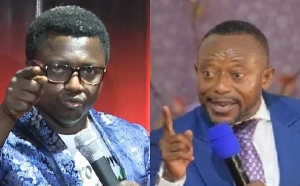- Home - News
- TWI News | TV
- Polls
- Year In Review
- News Archive
- Crime & Punishment
- Politics
- Regional
- Editorial
- Health
- Ghanaians Abroad
- Tabloid
- Africa
- Religion
- Election 2020
- Coronavirus
- News Videos | TV
- Photo Archives
- News Headlines
- Press Release
Business News of Friday, 7 March 2014
Source: Antoinette Bradford
Ghana's Economy Precarious - Economic Intelligence Analyst
Manji Cheto, an expert in Global Politics and a world renowned risk analyst on Africa who is currently the Vice President of TENEO Intelligence, a London-based risk and communications consultancy advising international companies on ways to manage their operations in Africa, has advised the NDC government to pursue efficient management of its resources and projects and reduce the budget deficit in order to restore confidence in the troubled Ghanaian economy. Ms Cheto was speaking at a symposium organised by the Royal African Society and the Centre of African Studies in London on the theme "Ghana, 57 years after 1957: Recalibrating the Course of Progress." Speaking on a platform which was shared by Hon. Hanna Tetteh, Ghanaian Minister for Foreign Affairs; Nana Akufo Addo, 2012 Presidential Candidate, New Patriotic Party; Dr Michael Amoah, Research Associate, Centre of African Studies, Ms Manji Cheto, an Economic Intelligence Analyst painted a gloomy economic picture which, according to her would be a concern for any investor wanting to invest in Ghana. She referred to the economic indicators on Ghana and asserted that they were all pointing the wrong directions. She mentioned specifically the rising inflation, growing deficit and a rising national debt coupled with falling currency and the declining economic growth and opined that it would be very difficult for any investor to look favourably on investing in Ghana. Ms Cheto, whose expertise is primarily focused on the political economy of West Africa countries, in particular Nigeria and Ghana and whose responsibilities include monitoring political and economic developments in West African markets and reporting to both colleagues and company clients, made references to the 2013-14 budget statement by the Finance Minister, who was present at the event, and asked serious questions about the deficit financing as well as the dangers of not meeting economic growth and targets. Seeing the budget statement as some work of fiction, she questioned the growth forecast in the 2013-14 budget of 9 percent in the face of IMF recent downgrade of Ghana's growth prospect to 4.9 percent. She also questioned why a forecast growth of 2.0 percent in the first quarter of 2013 only yielded 0.3 percent in actual growth. She affirmed that Ghana's economy was in a real precarious situation and strongly disagreed with the position of President Mahama, during the recent State of the Nation address on the assertion that Ghana's economic difficulties were only short term problems. According to Ms Cheto, Ghana's economic problems were medium to long term and required deep seated policy solutions. She had very little confidence in the budget and its economic forecasts. She also questioned the recent decision by the government to accept and introduce free SHS in the recent State of the Nation address. Quoting from the President’s own economic analysis in the address to the nation, Ms Cheto questioned where the government was going to find the funding for the Free SHS in view of the President's own assertion last year that “The meat is now down to the bones.". She also wondered if it was not just an election gimmick. "This is a precarious situation. Can the government achieve this goal within 2015 and 2016? Is this realistic? This is about trust, and trust is a big problem for investors.... Is this not just an election promise?" She asked about the free SHS promise. In his response to the serious questions which she had raised, Hon Seth Tekper, Ghana's Finance Minister blamed the current budget outruns on the huge salary bills arising out of the implementation of the single spine salary structure. He also blamed the precarious economic conditions on the withdrawal of donor funding and the dollarization of the economy. Speaking earlier in response to Nana Akufo-Addo’s challenge to the government to do more to let Ghanaians know that public leadership is a vehicle for the pursuit of the common good and not for self-enrichment, Hon Hannah Tetteh also blamed the economic difficulties the government was facing to the high cost of public sector salary payments. She blamed the Single Spine Salary Structure, which according to her was wrongly calculated by the Advisory Board. She also reiterated that the expectations of Ghanaians on the oil revenue were not realistic as Ghana produces a tiny amount of oil compared to Nigeria, Angola and Equatorial Guinea. She also blamed Ghana’s reliance on the West African Gas Pipeline for the fluctuating power supply in Ghana but was very hopeful of the Bui Dam’s ability to improve on the Ghana’s energy supply. Nana Akufo-Addo who spoke at the symposium earlier had laid the blame of poor economic conditions in Ghana squarely on the door of political leadership creating an environment for large numbers of youth unemployment in the country and tied that blame to "a failed educational system that does not provide them with the requisite skills and a structurally rigid economy that simply cannot generate the large pool of good jobs with good pay." He stressed on the need to redefine the structure of our economy by transforming it by widening the manufacturing base, adding value to our products rather than exporting them in the raw form, adding that “Ghana deserves a leadership that thinks of the next generation and not the next election.”
Antoinette Bradford Reporter on African Affairs Centre for Policy Analysis (CPA) London.










